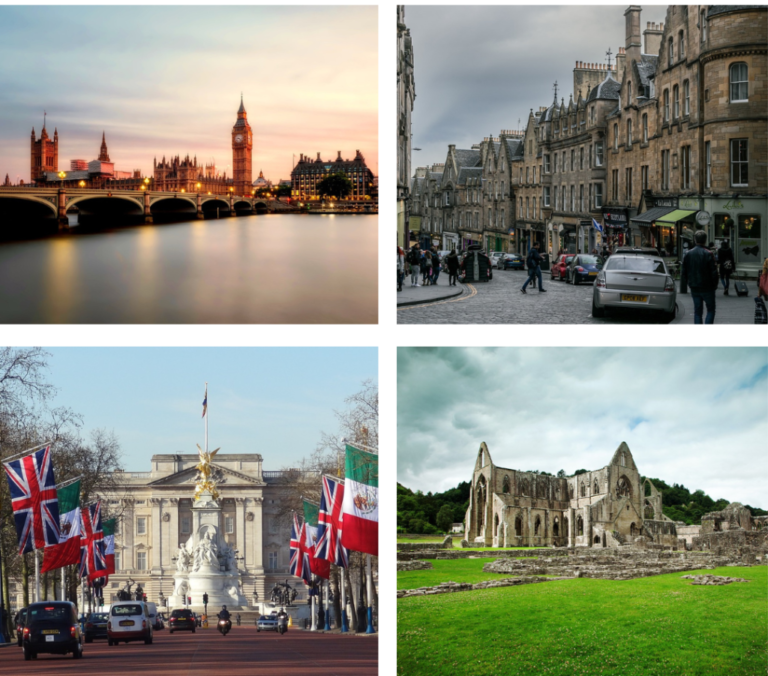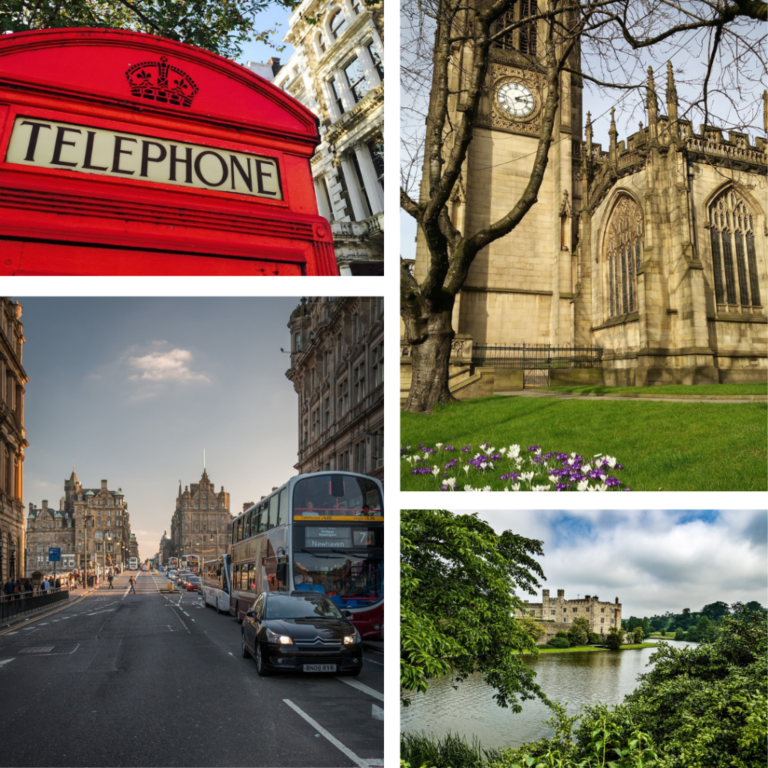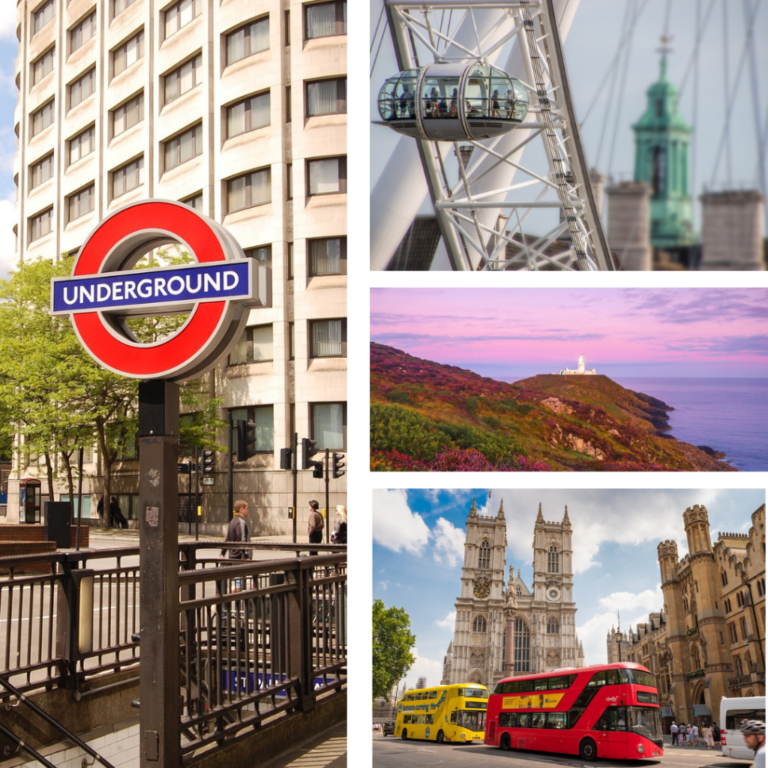Digital Nomads in the UK: Work and Living Guide
In this guide we tell you everything you need to know about being a digital nomad in the UK: costs, taxes, visas, best destinations and more.
Living as a digital nomad can be very exciting, as it allows you to work from almost any corner of the globe, be it a secluded beach, a big city, a mountain village or a rural area. But it’s not all that simple: before moving to a new country, digital nomads need to know what the requirements are for living there, what taxes they have to pay, which cities are best suited to this lifestyle and much more. In this respect, the UK is a very attractive destination for those working remotely. If you work remotely and plan to move to this great island to live and work, this is the guide for you. We tell you everything you need to know about being a digital nomad in the UK.
Moving temporarily to the UK as a digital nomad requires careful preparation. It is important that you know the particularities of each region, the legal requirements and the benefits that each type of visa can offer in order to avoid setbacks during your stay. That’s why we’ll take a look at all the key things a digital nomad needs to know before travelling to the UK. We will explore everything from the visa options available and the best places to work, to recommendations on connectivity, health and daily life in this cosmopolitan destination.
Why be a digital nomad in the UK?
The UK has become an attractive destination for digital nomads from all over the world. Its perfect combination of history, unspoilt nature, vibrant culture and job opportunities is a huge draw for digital nomads. While many leave the island because of its rainy and overcast climate, many others choose it as a temporary home.
Being a digital nomad in the UK will allow you to live in the iconic city of London, travel the picture-perfect landscapes of Scotland and Wales, and get a real feel for Irish culture. After all, this island of four countries is full of beauty, and working remotely will give you the chance to explore every corner of it. The UK appeals to creative professionals as well as those working in digital and technology. Great connectivity and a multicultural environment are other factors that make this corner of the globe an ideal place for those seeking inspiration and opportunities in an international environment.
Here are some of the advantages of living as a digital nomad in the UK!
1. Digital nomad communities and networking
Cities such as London, Manchester and Edinburgh have active communities of digital nomads and remote workers who organise networking events and meet-ups. These spaces will allow you to connect with like-minded people, establish links, find new opportunities for collaboration and develop a professional network in an international environment. This is no minor detail, as it will help you a lot with the integration in the new country.
2. High quality of life and security
One of the key aspects a digital nomad considers before moving to a new country is security and quality of life. In this respect, the UK offers a high standard of living with first-class services, from an accessible health system to efficient public transport.
It is also a safe and politically stable place, which gives expatriates peace of mind. The main cities have a variety of green areas, good services and quiet neighbourhoods, which create a comfortable environment to live and work in.
3. Global connectivity
Being located in Western Europe, the UK is a strategic hub for travel to other countries in the region and beyond. London in particular is an international transport hub, with direct connections to cities across Europe, Asia, Africa and North America, allowing digital nomads to move around with ease for events, city breaks or business trips.
4. Quality of internet connection and workspaces
The technology infrastructure in the UK is first class, with fast and reliable internet connectivity in most cities and towns. In addition, there are multiple coworking options in London, Birmingham, Bristol and other cities. Spaces such as WeWork, Impact Hub and The Trampery offer flexible working environments, while numerous cafés and libraries offer good Wi-Fi for those who prefer a more relaxed atmosphere.
By the way, if you plan to move to the UK as a digital nomad, Holafly’s eSIM will be one of your greatest allies. It gives you unlimited data, fast and secure internet and no roaming charges.
5. Cultural richness and diversity
The UK’s cultural richness is unique: each city offers a universe of museums, theatres, events and festivals that attract people from all over the world. Being a digital nomad in these lands will allow you to immerse yourself in their culture and way of life, travel back in time in their medieval castles, savour their delicious and varied gastronomy and much more.
6. Professional development opportunities
The UK economy is one of the largest in the world, so there is no shortage of job opportunities, especially in sectors such as technology, finance, marketing and consultancy. Large cities and financial centres give nomads access to innovative companies and an advanced working community, with possibilities to collaborate with start-ups and large corporations.
7. Access to healthcare
Digital nomads spending long stays in the UK can benefit from the National Health Service (NHS), the UK’s public health system, which provides high-quality medical care. While there are specific requirements for access to the NHS, there are also many private health insurance options that allow for fast and comprehensive care.
As you can see, all these advantages make the UK an attractive and strategic option for digital nomads looking for a base in Europe, combining comfort, quality of life and multiple possibilities for personal and professional growth.

Where to live and work as a digital nomad in the UK
Before we talk about visa issues, cost of living, healthcare, health insurance and other important aspects, we help you choose where to settle as a digital nomad in the UK. Note that there are four countries, each with its own cultural identity, laws and decentralised systems of government:
- England: the largest and most densely populated country in the UK. Its capital is London, which is also the capital of the United Kingdom as a whole.
- Scotland: located to the north of England, Scotland is known for its stunning scenery, castles and cultural traditions. Its capital is Edinburgh.
- Wales: located to the west of England, Wales is famous for its mountains and medieval castles. Its capital is Cardiff.
- Northern Ireland: located on the island of Ireland, to the north of the Republic of Ireland, which is an independent country. The capital of Northern Ireland is Belfast.
What are the best cities to be a digital nomad in the UK?
Part of the list of things you need to do before moving to a foreign country is to choose where to live. The best location will depend on your personal preferences, budget, available opportunities, among other things. For example, if you plan to live in a populated area that offers many networking opportunities, London, Birmingham or Manchester are great options. On the other hand, if you prefer a lower cost of living, Glasgow in Scotland or Northumberland in England are more affordable destinations.
Here’s our pick of the best cities in the UK to live and work remotely:
- London is one of the most dynamic and multicultural cities in the world, ideal for those seeking a vibrant and professional working environment. But it is also one of the most expensive destinations in the UK. London has countless coworking spaces, from WeWork to Impact Hub, cafes and public libraries with excellent connectivity. It is also a hub for networking events and conferences, with opportunities to meet other professionals and expand your network.
- Manchester: one of the most important cities in the north of England and a more affordable alternative to London, without sacrificing the cosmopolitan atmosphere. The city is known for its growing tech scene, with several coworking facilities such as Colony and Work.Life. Manchester has a large startup community and a strong presence in the creative and technology sectors. Nightlife, culture and dining options are vibrant and varied, as are the many surrounding natural areas that invite weekend getaways.
- Edinburgh: Scotland’s capital city is a popular destination for digital nomads seeking a relaxed and cultural environment. Edinburgh is famous for its historic beauty and its festivals, including the Edinburgh Festival Fringe. The city has coworking options such as CodeBase and The Melting Pot, which focus on the technology sector and social entrepreneurship. The quality of life here is high and prices are lower than in London. However, the main advantage is the proximity to some of the UK’s most stunning natural landscapes, such as the Highlands.
- Bristol: is an alternative and artistic city that has gained popularity among digital nomads for its focus on sustainability and creativity. Home to a large community of artists and freelancers, Bristol offers a variety of coworking spaces such as DeskLodge and Runway East, ideal for freelancers and entrepreneurs. The city has a relaxed atmosphere and a vibrant cultural life, with events and festivals attracting people from all over Europe. In addition, the cost of living is lower than in London, making it an affordable and convenient option to live in.
- Brighton: located on the south coast of England, Brighton is perfect for those looking to live close to the sea and in a relaxed but active environment. Its community of digital nomads is constantly growing and there are many coworking options, such as Platform and The Projects. The city is known for its inclusive and diverse environment and its lower cost of living than London, especially in the neighbourhoods near the beach.
- Birmingham: England’s second largest city and a growing centre for digital professionals. Birmingham stands out thanks to its vibrant tech and business scene, where you can find several coworking spaces, such as Alpha Works and Innovation Birmingham. The cost of living is more affordable than London and Manchester and it has excellent transport links to other parts of the country. It also has a lively cultural scene, ideal for those seeking an urban life without the high costs of the capital.
- Glasgow: Like Edinburgh, Glasgow offers a mix of Scottish culture and creative community, with a slightly more affordable lifestyle. The city has a focus on the creative and technology sectors, with coworking spaces such as Collaborate and RookieOven. Glasgow is known for its hospitality and offers a vibrant community of expats and digital nomads. Its proximity to Edinburgh also makes it easy to commute between the two cities to take advantage of the professional and cultural opportunities in both.
- Leeds: Located in the north of England, Leeds has experienced growth in its tech scene, making it an excellent choice for those looking for opportunities in sectors such as fintech and creative services. The city has coworking facilities such as Avenue HQ and Wizu Workspace, and has an active nightlife and cultural scene. The cost of living in Leeds is quite affordable compared to other UK cities, allowing digital nomads to enjoy a good quality of life without high expenses.
Which one will you choose?

Visas for legal residence in the UK
Currently, the UK does not offer a visa or programme for digital nomads. However, you can opt for two alternatives to live and work there: the Innovator Visa and the Standard Visitor Visa.
- The Innovator Visa is a good option for digital nomads looking to set up or run a business within the UK. The main difference with other visas is that it has an entrepreneurial focus, so you will need to present a business idea in support of your application. It has an initial duration of 3 years, with the possibility of extending it indefinitely, as long as you meet the requirements.
- The Standard Visitor Visa is the most common and the one most digital nomads apply for. It allows you to work from the UK for six months and is valid for study and tourism. However, please note that you will not be able to work for a local company or receive payments from clients within the country.
If you want to find out more, don’t miss our guide to visas for digital nomads in the UK. There you will find all the information you need.
Important: If you are a frequent traveler and want to stay connected without worrying about expensive roaming or looking for a new SIM at every destination, Holafly’s subscription plans are for you. With a single eSIM, enjoy internet in more than 170 countries for a fixed price and no surprises on your bill. travel without limits and connect easily and securely! 🚀🌍

What taxes do I have to pay as a digital nomad in the UK?
Another aspect that digital nomads who are going to live and work in the UK should pay attention to is taxation. The tax system includes several types of taxation for individuals and companies, which may also vary from country to country. Therefore, the first thing you should do is to choose a UK country and then find out what the relevant taxes are. For example, if you opt for Ireland you can find out more with this guide.
Another point to note is that, in general, the UK has double taxation agreements with many countries, which means that foreign income is not taxed twice. These treaties can be useful for digital nomads who are resident in the UK, but have income from other countries. However, we recommend that you seek expert advice to understand the individual tax implications and the possible benefits or exemptions that may apply.
Being a digital nomad in the UK: What health insurance should you take out?
Choosing the best health insurance for foreigners in the UK can be complicated, as there are many options. However, it is very important that you take the time to evaluate the different possibilities. Having health insurance for the time you will be living in the country will help you save a lot of money on health issues.
The UK offers a high quality public health system through the National Health Service (NHS), which provides free medical care to residents and citizens. However, for digital nomads who are not permanent residents, access to the NHS may be limited or involve additional costs. It is therefore wise to choose private health insurance to cover you for the duration of your stay in the country.
Now, which insurance to choose? While there are many options, we recommend you opt for Allianz Care, Cigna Global, AXA Health, BUPA Global or Vitaly Health. With any of them you will have excellent coverage and access to quality care, plus reduced waiting times and coverage for services that the NHS might not provide to non-residents. It is important that you check the conditions of each insurance policy to ensure that it covers your needs during your stay in the UK.

Daily life in the UK
If you’re wondering what it’s like to be a digital nomad in the UK, you’ll find that you’ll be able to find the perfect balance between work and play. But, let’s look a little more in depth at aspects such as transport and mobility, financial management and more.
1. Transport and mobility
The UK has many public and private transport options, ideal for exploring its cities and rural areas. In London, the Tube is one of the fastest systems, while places such as Manchester, Edinburgh and Glasgow have tram and bus networks. In turn, the main cities are connected by a train service, which is also the most convenient way to travel. For short distances or specific transfers, taxis and car-sharing services such as Uber are easily accessible.
If you plan to drive in the UK, it is important to know that you can use your foreign licence for a certain period (usually up to 12 months), depending on your nationality. For longer stays, it is possible to validate your foreign licence. If this is not possible, obtaining a UK licence from scratch through a theory and practical test is fairly straightforward.
2. Financial management
The UK is a foreigner-friendly country in terms of managing finances and offers banking options that make everyday life easier. Traditional banks such as HSBC, Lloyds and Barclays offer bank accounts specifically for temporary residents, with access to an extensive network of ATMs and branches. Among digital banks, Revolut, Monzo and Starling Bank are popular options that allow you to manage money from an app, make international transfers and avoid high fees.
At the same time, most cities and towns have accessible ATMs, although it is important to check that your card does not incur international fees. In that case, you have the option of using digital banks and cards such as Revolut, which allow commission-free withdrawals in foreign currency.
3. Food
Food prices, as well as eating out in the UK, suit all budgets. Food in the UK is varied and there are plenty of options for any budget. For example, for groceries and basic goods, you can go to supermarkets such as Tesco, Sainsbury’s, Asda and Morrisons, which are the most common. There are also cheaper options such as Aldi and Lidl, as well as shops specialising in international products and local markets where you can find fresh produce.
What about restaurants? Dining out in the UK can be cheap or luxurious, depending on the type of restaurant. A menu in a mid-range restaurant can cost between US$12 and US$18, while eating in a high-end restaurant can cost around US$40. You can also find traditional pubs and chains such as Wetherspoons with affordable lunch options.
4. Leisure and free time
The great thing about being a digital nomad in the UK is that you can enjoy a huge variety of outdoor activities and sports, as well as festivals, cultural activities and much more.
If you lead a healthy lifestyle and attach importance to sport and physical activity, you can get a monthly gym membership. In the big cities there are branches of chains such as PureGym and The Gym Group, whose prices are around $20-40 per month. In addition, there are local sports clubs for football, rugby and other popular sports.
For those who enjoy walking, the UK offers natural areas such as the Lake District and the Snowdonia and Brecon Beacons National Parks in Wales. There are also urban walking trails to explore the architecture of cities such as Bath and York. If you opt for cultural activities instead, in London and Edinburgh you can take part in famous festivals such as the Edinburgh Fringe Festival and the Notting Hill Carnival. At the same time, destinations such as Manchester and Liverpool offer a wide variety of concerts and arts events throughout the year.
Cost of living as a digital nomad in the UK
The cost of living in the UK varies considerably from city to city, but to avoid any surprises, it is important to budget for the most common expenses for a comfortable stay. Here is a summary of the main costs you will incur in the country:
- Accommodation: renting a one-bedroom flat in London can cost around $1,850-2,500 per month. Yes, the UK capital is an expensive city. But, in smaller cities such as Manchester or Bristol, the rent is around $800 to $1,200, which is a bit more affordable. You can also consider co-living options to reduce these costs and enjoy additional services in the process.
- Coworking spaces: coworking space memberships range in price from $190 to $450 per month, depending on the location and facilities on offer. Some of the best known spaces are WeWork, Huckletree and Workspace.
- Transport: in London, a monthly travel card for the tube and buses costs approximately $160. In smaller cities, transport costs are lower, with options for weekly or monthly passes to suit different needs.
- Food: food expenditure will depend on your lifestyle. An average monthly supermarket purchase can be around $240-370. For dining out, you’ll have plenty of options to suit tighter budgets, as well as luxury restaurants.
- Leisure and Entertainment: going to the cinema or theatre, for example, can cost around $12-19 per ticket. In contrast, sporting events, such as football matches, tend to have high prices, especially in the Premier League, with tickets ranging from $60-130.
Which is the cheapest country in the UK to live in?
Within the UK, Northern Ireland stands out as the cheapest region to live in. Cities such as Belfast and Derry (Londonderry) offer a more affordable cost of living compared to other areas of the country. Meanwhile, the average rent in the North East of England is $730 per month, making it one of the most affordable regions. In addition, English cities such as Liverpool, Manchester and Sheffield are also renowned for their affordability and quality of life.
In conclusion, the UK is an ideal destination for digital nomads seeking a balance between work and lifestyle. Every aspect of daily life is supported by quality services and options for all budgets, making it an excellent choice for work and unique cultural experiences.
Digital nomads in the UK: frequently asked questions
Public transport in the UK is efficient and accessible, with an extensive network of trains, buses and metros. For long distance travel, trains and buses from companies such as National Express and Megabus are popular and affordable options.
Yes, the UK has a wide variety of coworking spaces, especially in cities such as London, Manchester and Edinburgh. Many of these venues offer services such as fast internet, meeting rooms and networking events.
The cost of living in the UK varies from city to city. London is one of the most expensive, while places like Manchester, Edinburgh or Belfast offer more affordable living costs. The budget for a digital nomad can range from $1,900 to $3,800 per month, depending on location and lifestyle.
Currently, the UK does not have a specific visa for digital nomads. However, there are other options, such as the short-stay visitor visa, the Innovator visa or the Global Talent visa, depending on the purpose of the trip and what you plan to do.





 Language
Language 


















 No results found
No results found






